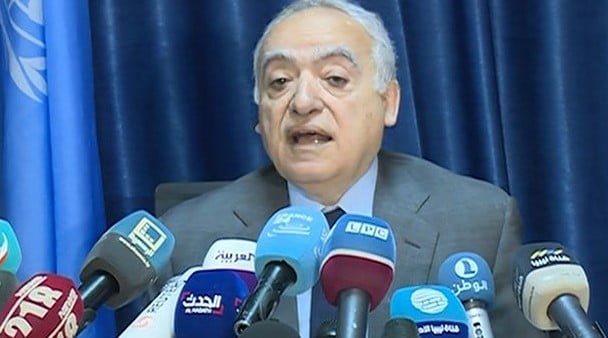By Sami Zaptia.

London, 1 April 2019:
Thirty-seven House of Representatives (HoR) members called on the Attorney General to open an investigation into the ‘‘dangerous’’ corruption claims made by UNSMIL head Ghassan Salame.
Salame had claimed in a television interview last Wednesday that Libya’s political elite were corrupt, raping public funds to reinvest their ill-gotten gains overseas resulting in a millionaire in Libya every day.
The HoR members challenged Salame to reveal the evidence upon which he made his remarks and called on the Attorney General to use such evidence if it exists to prosecute those accused of corruption.
The HoR statement said that if Salame was unable to produce any such evidence of corruption, then his remarks were a means of political blackmail or extortion as a means to pressure Libyan politicians into accepting his agenda at the forthcoming National Conference (Multaqa) to be held in Ghadames later this month.
Meanwhile, Presidency Council member Mohamed Ammari also condemned Salame’s ‘‘irresponsible’’ comments which he said only added confusion to the political scene. He criticised his generalization adding that it defeats his aim of trying to gather a National Conference which will be made up of corrupt politicians. It is noted that Faiez Serraj, as head of the Presidency Council did not make a direct comment about Salame’s remarks.
In the same vein the High State Council (HSC) released its own statement. It condemned Salame’s generalized remarks accusing the political elite of corruption. They said the remarks tainted all Libya’s politicians and political institutions without being specific.
The HSC said media remarks were not the means for fighting corruption and that Salame’s remarks were made intentionally to taint and reduce public confidence in Libya’s politicians and political institutions.
The HSC called on Salame to either be specific in his accusations or make an apology.
It will be recalled that at press conference held on 20 March in Tripoli, UNSMIL head Ghassan Salamé had announced that his planned National Conference (@Multaqa.Libya) will be held from 14 to 16 April at the ‘‘neutral’’ Libyan city of Ghadames.
There had been concern that if Salame did not choose what was perceived as a neutral venue by Libya’s east and west they would not attend the National conference.
Salame said that there would be between 120-150 delegates at the event, representing all components of Libyan society. He added that all attendees will be Libyan as there would be no foreign parties present at the Conference.
Keen to allay the fears and suspicions of the two Libyan Political Agreement bodies, and to secure their attendance, Salame stressed that the Conference will not be an alternative to existing representative political institutions such as the Presidency Council, the House of Representatives (HoR) and the High State Council (HSC).
The HoR and HSC have been worried that the Conference was Salame’s attempt to further weaken them and undermine their authority and legitimacy by by-passing them and going over their heads directly to the Libyan public. To this end, they had demanded to know more details in advance about the National Conference such as its agenda, make-up and number of attendees, location and authority of its outcomes.
There have also been persistent rumours that the HoR / the east / Hafter and their allies in the west, have been or are planning an alternative National Conference to negate any possible negative outcomes from Salame’s National Conference.
Salame also explained that the National Conference will not have executive powers but will offer recommendations. These will include recommendations on the date of presidential and parliamentary elections and the manner in which they will be carried out. He explained that It will then be for the HoR and the HSC to respond to the recommendations, but that the UN would endorse the recommendations made by the National Conference.
However, in a thinly veiled threat, Salamé also said that if the HoR and HSC did not respond to the demands for elections of the silent Libyan majority of over 85 percent – he would find alternatives.
Adding to the intrigue about what was really agreed at the meeting, Salame came across as lukewarm when asked about the Abu Dhabi Haftar-Sarraj meeting. However, he indicated that there would be further meetings between the two.
His emphasis that the National Conference will not have executive powers is designed to reassure the HoR and State Council and ensure that those from it who were invited – would attend.
It will be recalled that the National Conference was part of Ghassan Salame’s multi-pronged 2017 Libya Action Plan. It was intended to pressurise the HoR and HSC to break the political impasse, precipitate elections and take Libya out of its current transitional state.
It is in this light that Salame’s Libyan ‘‘political elite corruption’’ media remarks are seen by the HoR and the HSC. 0000






